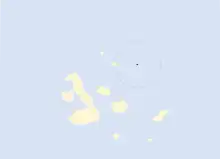Genovesa cactus finch
The Genovesa cactus finch (Geospiza propinqua) is a species of bird in the tanager family Thraupidae. It is one of Darwin's finches, and is endemic to the Galápagos islands, Ecuador, where it is restricted to Genovesa Island.
| Genovesa cactus finch | |
|---|---|
%252C_female%252C_Genovesa.jpg.webp) | |
| Scientific classification | |
| Domain: | Eukaryota |
| Kingdom: | Animalia |
| Phylum: | Chordata |
| Clade: | Dinosauria |
| Class: | Aves |
| Order: | Passeriformes |
| Family: | Thraupidae |
| Genus: | Geospiza |
| Species: | G. propinqua |
| Binomial name | |
| Geospiza propinqua Ridgway, 1894 | |
 | |
Its natural habitat is dry shrubland and it is commonly seen on the ground. Its main food source is the cactus Opuntia.
Taxonomy
The large cactus finch is one of Darwin's finches, a group of closely related birds which evolved on the Galápagos Islands. The group is related to the Tiaris grassquits, which are found in South America and the Caribbean.[2] An ancestral relative of those grassquits arrived on the Galápagos Islands some 2–3 million years ago, and the Española cactus finch is one of the species which evolved from that ancestor.[3]
Some taxonomic authorities, including the International Ornithologists' Union, have split the species from the Española cactus finch. Others still consider them conspecific.
References
- BirdLife International (2020). "Geospiza propinqua". IUCN Red List of Threatened Species. 2020: e.T103815544A182516621. doi:10.2305/IUCN.UK.2020-3.RLTS.T103815544A182516621.en. Retrieved 20 November 2021.
- Newton, Ian (2003). Speciation and Biogeography of Birds. San Diego, CA, USA: Academic Press. p. 78. ISBN 978-0-12-517375-9.
- Grant & Grant (2008), p. 25.
Cited works
- Grant, Peter R.; Grant, B. Rosemary (2008). How and Why Species Multiply: The Radiation of Darwin's Finches. Princeton, NJ, USA: Princeton University Press. ISBN 978-0-691-13360-7.
- Jobling, James A. (2010). Helm Dictionary of Scientific Bird Names. London, UK: Christopher Helm. ISBN 978-1-4081-2501-4.
External links
![]() Media related to Geospiza propinqua at Wikimedia Commons
Media related to Geospiza propinqua at Wikimedia Commons
